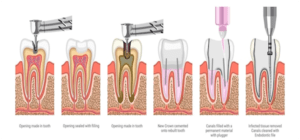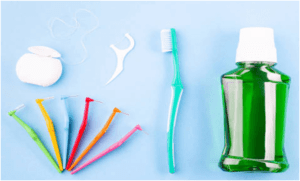If you are seeking top-notch root canal on crowned tooth treatment, look no further than Neo Dental Care, one of the best dental clinics in Noida. Led by the expertise of Dr. Suhrab Singh, Neo Dental has been dedicated to delivering exceptional dental services like root canal and dental crown treatment in Noida.

Dental crowns are an effective solution for restoring damaged teeth, providing both aesthetic appeal and functional support. However, even with a crown, the underlying tooth can still be vulnerable to infection and decay. That is where the significance of “root canal on the crowned tooth” comes into play. This essential treatment saves your crowned tooth from potential complications and ensures its long-term viability, helping you maintain a healthy and confident smile for years.
At Neo Dental Care, Dr. Suhrab Singh, an esteemed dentist in Noida, has performed many root canal crown procedures, earning the trust and gratitude of thousands of patients. He is well-versed in the intricacies of combining root canal treatment with dental crowns to preserve the functionality and aesthetics of your teeth.
In this blog, we will discuss root canals on crowned tooth, their procedure, success rates, post-treatment care, and more.
Do Crowned Teeth Need Root Canals?

While dental crowns are designed to protect and strengthen damaged teeth, there are instances when the tooth underneath may still require a root canal. Teeth with large cavities, extensive decay, trauma, or infection may develop issues even after being crowned. In such cases, a root canal may be the most suitable option to save the tooth and maintain oral health.
A root canal treatment helps remove the infected or inflamed pulp, disinfect the root canals, and restore the tooth’s health. It enables patients to retain their natural teeth and preserve their oral health.
Why You Need a Root Canal on Crowned Teeth?
Dental crowns help protect and strengthen damaged teeth but are not immune to potential issues. Despite the crown’s protective function, specific dental problems can still arise in the underlying tooth, making a root canal necessary. Here are the primary reasons you may need a root canal on a crowned tooth:
1. Persistent or New Infections: Despite being crowned, teeth can still develop infections due to bacteria infiltrating through microscopic gaps. A root canal is necessary to remove infected pulp and prevent the spread of infection.
2. Decay: If the crown’s margin becomes compromised or there is decay under the crown, it can lead to further damage to the tooth. A root canal can address this issue and save the tooth from extraction.
3. Fractures: Dental crowns can protect weakened teeth from fractures. But sometimes fractures can still occur, reaching the tooth’s nerve. A root canal can relieve pain and preserve the tooth.
How Long Does a Root Canal with Crown Last?
A well-maintained root canal and crown can last 10 to 15 years or even longer with proper care. The longevity of a crown or cap after a root canal depends on several factors.
The key factors influencing the lifespan of a root canal with a crown include:
- The patient’s oral hygiene practices.
- The quality of the dental work performed.
- The type of crown used.
- The overall health of the surrounding teeth and gums.
Regular dental check-ups and cleanings are crucial to monitor the health of the treated tooth and ensure early detection of any potential issues that may arise.
By following good oral hygiene habits and seeking timely dental care, individuals can maximize the lifespan of their root canal with a crown and enjoy the benefits of a restored and functional tooth for years.
What Happens to My Crown if I Need a Root Canal?
If you need a root canal on a crowned tooth, the crown plays a significant role in the treatment process. Your dentist will access the infected or damaged pulp through the crown during the root canal procedure. They will carefully create an access hole in the crown to reach the tooth’s interior and perform the root canal treatment.
After the procedure, the dentist will seal the access hole in the crown with a filling material to maintain the tooth’s structural integrity. If the crown was significantly damaged during the root canal procedure or no longer fits the tooth securely, your dentist may recommend a new crown to provide the best long-term outcome.
What to Expect During and After the Treatment?
A root canal on a crowned tooth is similar to a regular root canal procedure.
During the Treatment:
1. Examination: Your dentist will assess the crown and take X-rays to evaluate the extent of the issue.
2. Anesthesia: The dentist will administer local anesthesia to numb the area around the affected tooth.
3. Access: The dentist will create an access hole through the crown to reach the infected or damaged pulp.
5. Filling: The root canals will be filled with a biocompatible material called gutta-percha.
6. Crown Restoration: If necessary, the dentist may adjust or replace the crown to protect and restore the tooth’s function.
After the Treatment:
You may experience mild discomfort or pain after a root canal and crown procedure. It can be managed with OTC pain relievers. You should follow post-treatment care instructions provided by your dentist. If you experience pain or unusual symptoms, consult your dentist immediately.
What is the Cost of a Root Canal on Crowned Tooth?
The cost of a root canal on a crowned tooth in Noida may typically range from INR 5,000 to INR 15,000 or more. However, the cost for root canals and crowns can vary based on several factors, including the complexity of the case, the type of crown used, the dentist’s experience, and the location of the dental clinic. The cost can be higher if additional procedures or treatments are needed, such as crown replacement or adjustments after the root canal.
Consult a reputable dentist in Noida, like Dr. Suhrab Singh, for a personalized treatment plan and cost estimate based on your dental condition. Dentists may also offer different types of dental crown treatment in Noida at various price points. So, discussing your options with the dental professional is important to make an informed decision.
Benefits of Root Canals on Crowned Teeth
- Tooth Preservation: Allows you to keep the natural tooth despite underlying issues, preserving oral health.
- Pain Relief: Alleviates pain and discomfort caused by infections or damaged nerves.
- Improved Function: Restores the tooth’s function, allowing normal eating and speaking.
- Aesthetic Restoration: Maintains the appearance of your smile with a well-fitted crown.
- Long-Term Solution: It can last for years when performed well and maintained properly.
- Prevents Extraction: Avoids the need for tooth extraction, preventing gaps or using more extensive replacements like implants.
- Cost-Effective: Root canals with crowns are often more cost-effective than tooth extraction and replacement options.
- Minimally Invasive: Preserves most of the tooth structure and requires minimal removal of healthy tooth material.
- Supports Adjacent Teeth: A restored tooth supports neighboring teeth and helps maintain proper alignment.
Success Rates of Root Canals on Crowned Teeth
The root canal through crown success rate is generally high. The procedure can be quite effective in preserving the tooth and alleviating pain. However, the success of the treatment depends on various factors, including:
- the extent of damage to the tooth
- the presence of any underlying issues
- the skill and experience of the dentist
- the patient’s oral hygiene habits
When performed by a skilled and experienced dentist, a root canal on a crowned tooth can have a success rate of approximately 85% to 95%. Regular dental check-ups and good oral hygiene practices are essential to ensure the long-term success of the root canal treatment on a crowned tooth.
Post-Treatment Care
The patient should follow these post-operative care tips after a root canal on crowned tooth:

- Take prescribed pain relievers or antibiotics.
- Refrain from chewing on the treated tooth until it is fully healed.
- Maintain good oral hygiene by brushing, flossing, and using mouthwash regularly.
- Stick to soft foods initially to avoid putting excessive pressure on the treated tooth.
- Avoid very hot or cold foods and drinks as the tooth may be sensitive.
- If you grind or clench your teeth, consider using a mouthguard to protect the restored tooth.
- If you experience persistent pain, swelling, or unusual symptoms, inform your dentist promptly.
- Continue regular dental visits for ongoing monitoring and preventive care.
Conclusion
A root canal on a crowned tooth is a specialized dental procedure that offers a chance to save infected or damaged teeth and maintain a healthy smile. You can expect excellent results and long-term oral health with the proper dental care and professional expertise. Remember, regular dental check-ups and good oral hygiene are essential to enjoying the lasting benefits of these treatments.
FAQs
Q.1 What percentage of crowns need root canals?
A: The need for root canals on crowned teeth varies. But it is not uncommon for crowned teeth to require this treatment for various reasons, such as infections, decay, or fractures.
Q.2 Which cap is better for teeth after a root canal?
A: A crown is typically recommended after a root canal as it strengthens and protects the treated tooth. Your dentist will guide you on the best material for your case, such as porcelain, ceramic, or metal crowns.
Q.3 Can you eat after a root canal with a crown?
A: You can eat after a root canal with a crown. However, avoiding very hot or cold foods immediately after the procedure is advisable, as your tooth and surrounding tissues may be sensitive.
Q.4 Can a crowned tooth be recrowned after a root canal?
A: In some cases, a crowned tooth may require recrowning after a root canal due to wear, deterioration, or changes in the underlying tooth structure. Your dentist will assess the situation and recommend the appropriate treatment.



